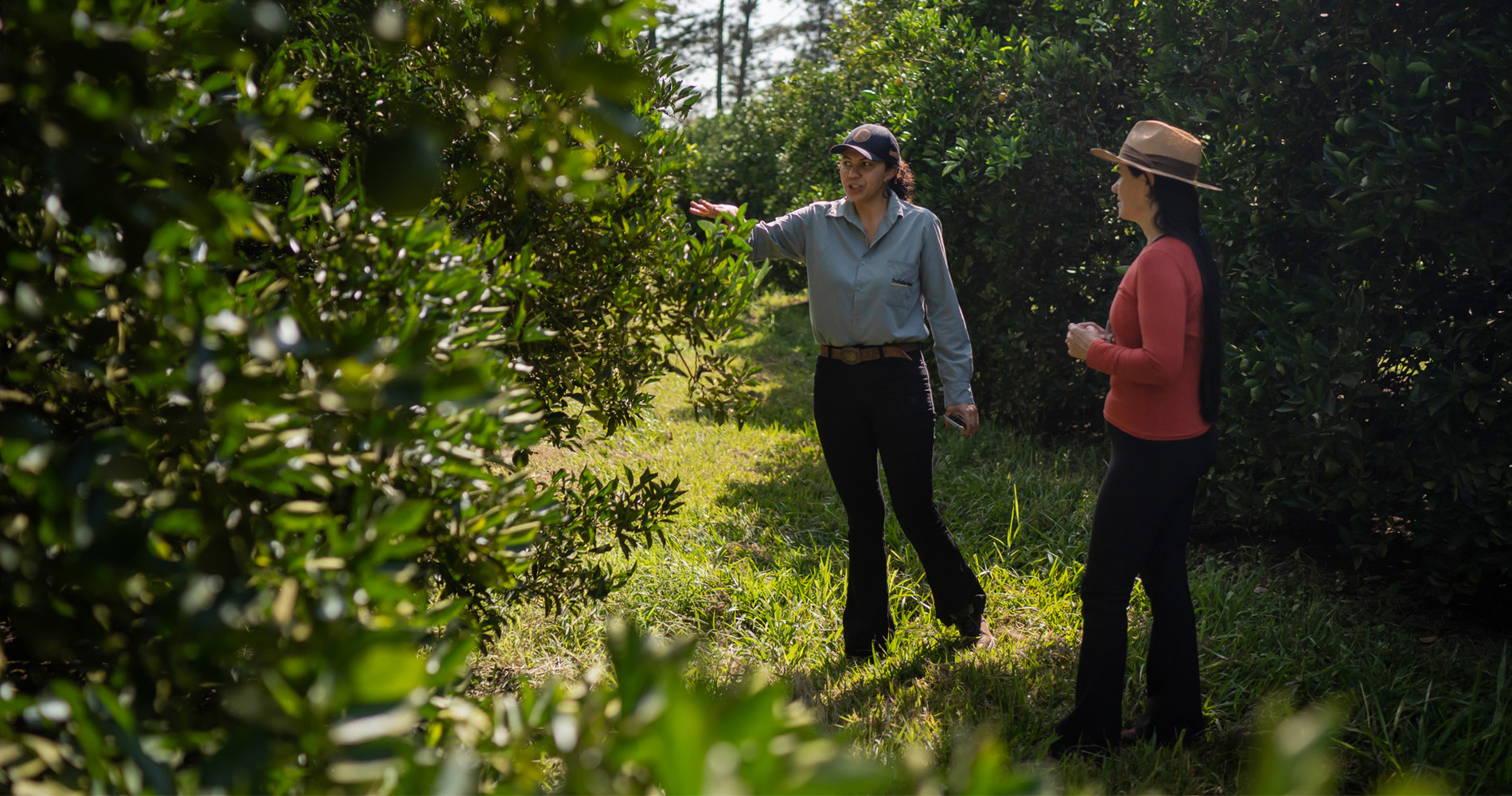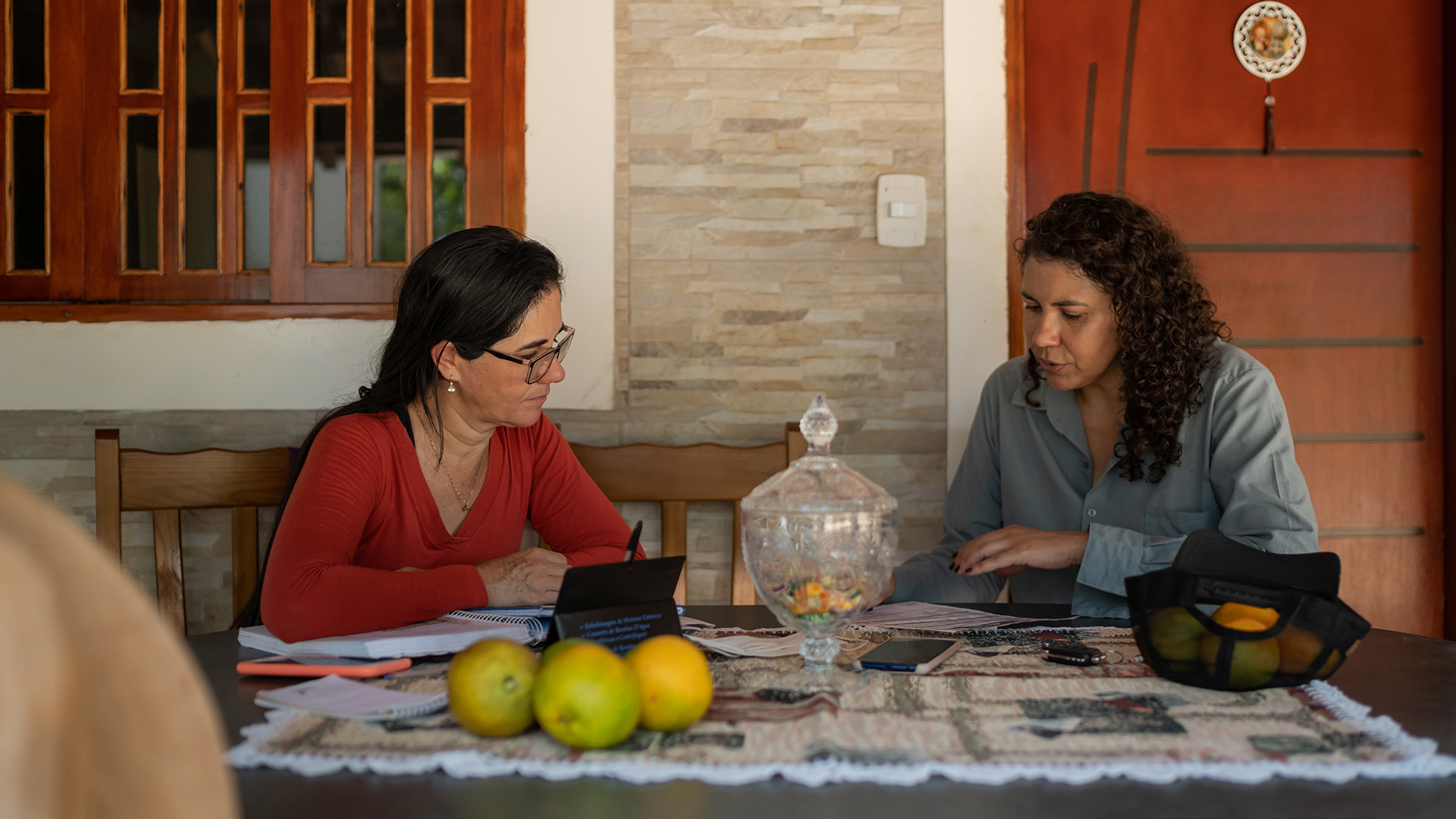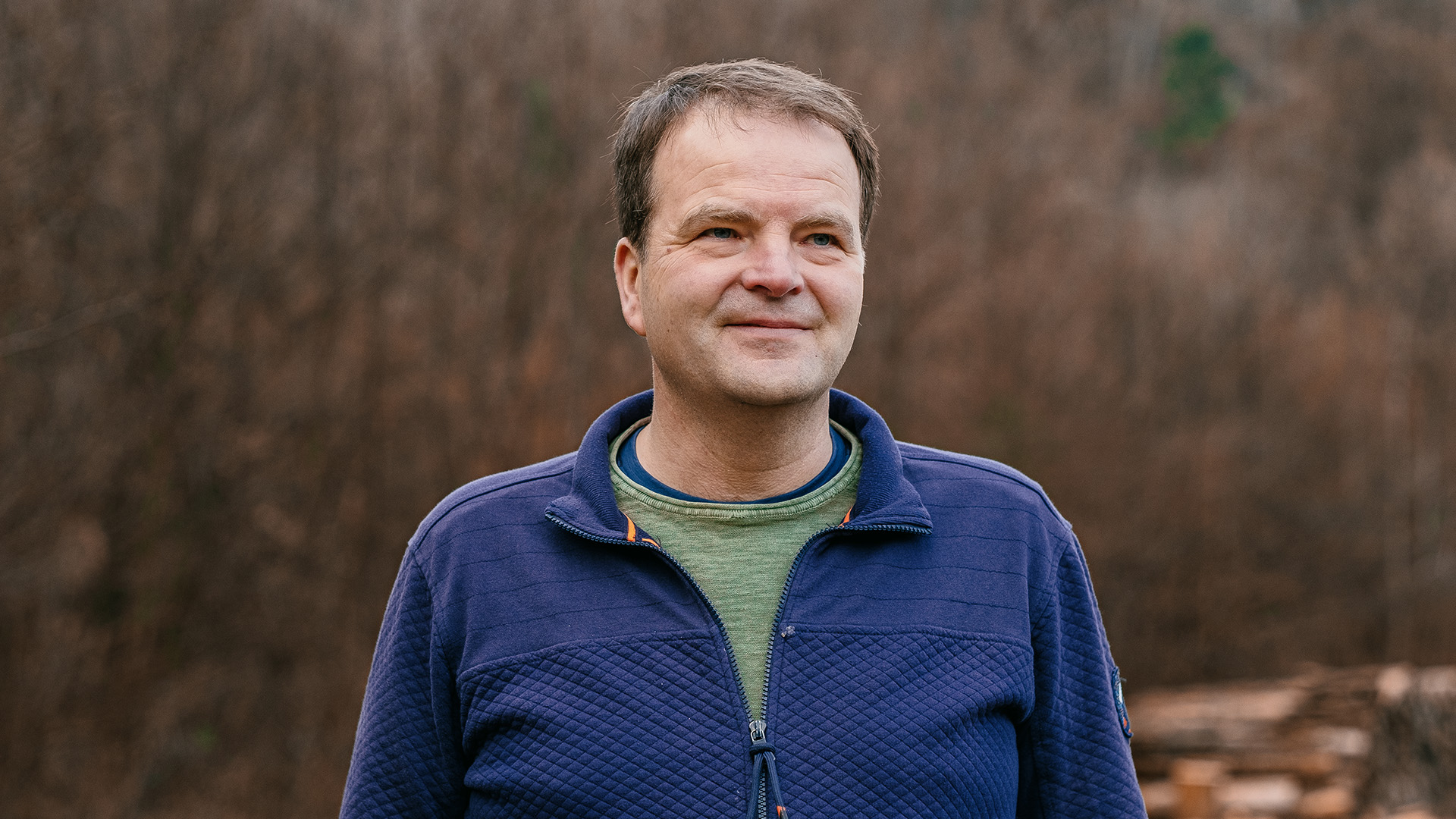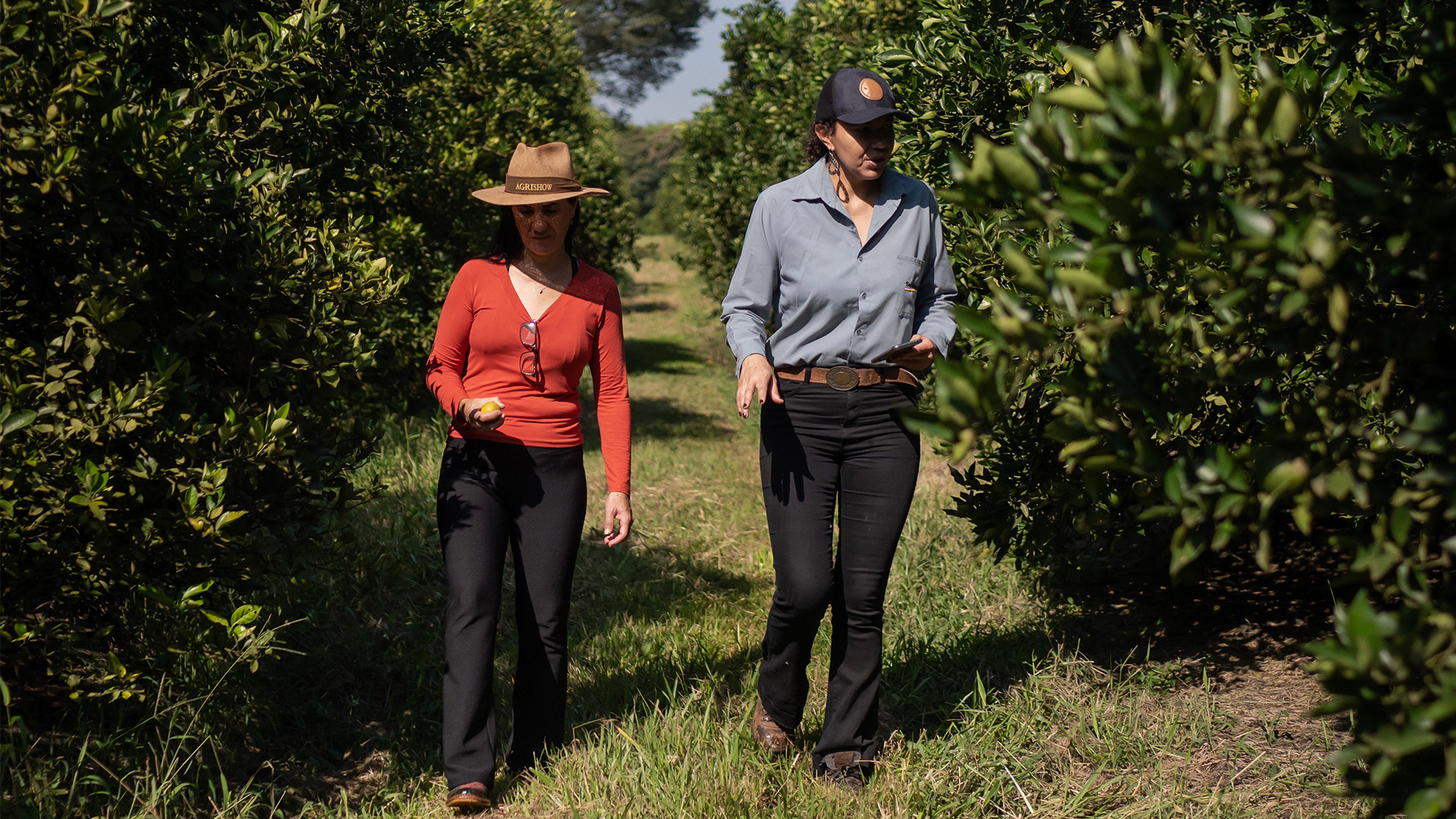
From orange farmer in Brazil to juice maker in Germany, making sustainability a winning game
When Bernd Neufert recounts meeting Sandra Zanardi on her orange farm in Brazil in June 2022, tears come to his eyes.
Neufert is the procurement manager and the key area lead for sustainable sourcing for the German fruit juice company Eckes-Granini and a family farmer himself. He was in Brazil to learn about a program that helps small growers like Zanardi run sustainable and profitable farms. The program, Fruto Resiliente, or Resilient Fruit, is operated by an international organization called Solidaridad.
Even a decade ago, a small farmer in Germany and one in Brazil would have no reason to know each other. The two came together because Eckes-Granini recognized that small farmers like Zanardi are a critical part of its efforts to create a sustainable supply chain, especially for orange juice, its most popular product. Using advanced data technology, Eckes-Granini has embraced sustainability as part of its business strategy.
When Neufert toured Zanardi’s farm with a group of other fruit buyers, she told her story.
In 2021, Zanardi’s husband died in the COVID-19 epidemic, leaving her alone. While she had lived on the farm for nearly 25 years, her husband ran the business and took care of the trees. She raised their two children and took care of the house.
“I had no knowledge of anything about the farm,” she recalls now, speaking on a video call from her 80 acres in rural São Paulo state. “And I was really unprepared for everything.”

Zanardi explained how Selma Coelho, an extension agent from Solidaridad, came into her life. Coelho had heard that Sandra needed help and began coaching her about how to run the farm. Solidaridad, supported with funding from companies like Eckes-Granini, provides free training from agronomists to small farmers.
“When I met Selma I started to have motivation,” Zanardi says. “I was willing to try.”
Even though Neufert’s home is halfway around the world in Germany, he had empathy for Zanardi’s struggles. He inherited a small farm from his parents in the Harz mountains in Lower-Saxony in north central Germany.
“Her story touched me because I’m a farmer too, and the problems are universal,” he says, speaking in an office at the Eckes-Granini bottling plant near Bonn, Germany. “Keeping it in the family, making ends meet, taking care of the land for the next generation.”
Neufert says that his visit to Zanardi’s farm was among many experiences that have shaped his philosophy about his work. He believes his responsibility goes beyond simply buying the ingredients for juice for European consumers. For him, the idea of a “sustainable supply chain” is about every hand that touches that fruit, from tree to bottle, and about the land on which it grows. And it doesn’t matter if that land is in Germany, Brazil, Peru, Poland or Spain.
“When I think of my job,” Neufert says, “I think it’s as much about making sure small farmers can succeed as it’s about selling juice – though I tell the sales guys we need to sell more juice so we can support these farmers.”
New European laws about corporate responsibility toward the environment and human rights are expected in the coming years. Some European countries, like Germany, have similar laws already.
For Neufert, the laws are secondary, in his view and that of the company, it’s a good business decision to be sustainable, to make sure working conditions are safe and that the environment is respected. This protects the reputation of the brands Eckes-Granini produces and makes customers feel good about the products they buy. Eckes-Granini has set a goal to have 100 percent of its juice sustainably sourced by 2030.
Ensuring that all the companies he works with are using best practices is a complex task that requires diligence, long-term relationships and technology, Neufert says.
He must keep track of hundreds of vendors and suppliers: Do they comply with labor laws? Environmental regulations? Food safety?
This is a complex task for a company like Eckes-Granini, Europe’s largest producer of branded fruit juice. The company, which is family owned, buys all its conventional orange juice from Brazil, which is the world’s largest orange grower. Three out of every five glasses of orange juice consumed in the world come from Brazilian orchards, according to the Brazilian Association of Citrus Exporters.
Eckes-Granini also buys apples, bananas and many other kinds of fruit concentrates and flavors to make different recipes. The company sells its fruit juices across Europe with brands like Granini, Pago, Joker and Hohes C. Keeping track of where the ingredients came from and the conditions under which they were produced and processed requires mountains of data.
Neufert uses information from the reporting agencies Sedex and EcoVadis, which provide business sustainability ratings and a wide range of data about the labor, safety and environmental practices of individual companies. Eckes-Granini also gathers its own information. As he says, it’s critical “to have the research done on who are the actors in your supply chain, at what position and what exactly is their function” – suppliers, farm cooperatives, processors, transporters – all the players that make up the fruit juice supply chain.
With just one other person to help, Anastasiia Strukova, Eckes-Granini’s sustainable sourcing expert, the job of inputting and integrating the data was overwhelming.
Neufert turned to Microsoft for help. Henry J. Kroeger, an Azure data specialist, and Frank Geisler, of GDS Business Intelligence, a Microsoft partner helped Neufert design a unique system. They built a custom data model on the Microsoft intelligent data platform. They used Azure Data Factory Flows to automate the process of inputting data into a central database.
To analyze the data, they customized a Microsoft Power BI dashboard. Power BI is a cloud-based platform that makes it easy to visualize an overview of certain types of data. In this case, that meant things such as the risk levels associated with an individual country or all the data about one type of fruit. Even more critical is that it’s easy to drill down into specifics about a particular vendor or supplier. The information is easier to share as well.
Neufert says that with the Power BI dashboard he’s able to explore the data in ways that make his job easier. “Many things become apparent suddenly, and that’s quite nice,” he says. “Before, we were scratching at the surface without coming really to a holistic picture.”
He shows an example of a mango supplier whose workers are getting only one day off per week and working more than 40 hours. “Not good. When this guy calls me again, I’ll say, ‘Look, we need to have a talk. This needs to change, or you’re not going to be a vendor or processor for us.’”
Some vendors, suppliers and farm cooperatives are skeptical when Neufert begins explaining the idea that running a business that meets sustainability guidelines may be more expensive in the short-term, but more profitable in the long-term.
He explains his thinking to them using a set of cards he created and calls it “the game that nobody loses.” He has cards for each player – the farmer, the vendors, the processors and Eckes-Granini as link to the consumer.

“We have some ground rules,” he says. “The first one is about long-term relationships. And because you only invest in a long-term relationship, the second rule is trust. So when I go to a supplier, I tell them what I like and don’t like, and I expect the same from them. And the third element is teamwork. We have to work together on this.”
When all the players commit to the game, Neufert says, the idea of “sustainable supply chain” benefits everyone involved – guaranteeing a steady supply of quality fruit for his company, as well as steady work for farm families and long-term stability and profits for all the players. On top of that, it’s better for the environment.
That is why Eckes-Granini, along with other food companies, supports organizations like Solidaridad. In this case, competition is set aside for the goal of channeling resources to maximize impact on ground and to support as many smaller farms as possible.
The Fruto Resiliente program began in November 2019, and it works directly with about 250 orange farmers in São Paulo and Minas Gerais, where most of Brazil’s oranges are grown. It hopes to eventually work directly with 480 growers in the region. Its online programs have reached 800 farmers, according to the program’s coordinator, Guilherme Ortega. The goal is to help small farmers succeed with better agricultural practices, as well as supporting better and safer working conditions.
“What we see is that the growers, and in particular the small-holder grower, are the backbone of our supply chains,” Neufert says. He says the smaller producers sometimes lack the resources or training to meet environmental, health and safety standards, and they need support. “They provide the swing production, and on the other hand, they are a risk factor, so we need to take care of them.”

Coelho, the extension agent who works with Zanardi on her farm in rural Brazil, agrees. She spoke in a video call side-by-side with Zanardi.
“The small producer in general, in Brazil, has endless difficulties — access to credit, access to suppliers,” she says. Fundecitrus reports that in the last 10 years, the number of farmers with properties of less than 123 acres in the orange-growing region has been halved.
Coelho says that one reason she was eager to help Zanardi was that she wanted to bring more women into the Fruto Resiliente program.
Zanardi says she has come to rely on Coelho for more than agricultural advice.
“Besides the motivation that she gives me, we have become friends, right, Selma? When I have doubts, I get in touch with her, she clarifies them for me.”
Zanardi says her crop is nearing harvest. She grows two varieties of oranges, Hamlin and Westin, and despite a little too much rain, the crop looks good.
It’s not easy running the farm. She says it’s rare that she gets a good night’s sleep, that it can be difficult negotiating in a male-dominated field, and that the work is hard. But she is making plans for the future of her farm.
“I dream of doing many things,” she says, “of renovating the orange plots, which are already old, of expanding the operation. Now I am a new person.”
You can read this story in German, Portuguese, and Spanish.
Top image: Selma Coelho, left, an extension agent for Solidaridad, with orange farmer Sandra Zanardi in Sao Paulo state, Brazil. Photo by Avener Prado for Microsoft.

